Expat magazines come and go, but while they last they're pretty interesting.
Consider Compass, which started life as a folded piece of paper and now publishes three monthly entertainment guides. Or 24seven, which until a management change last year did not shirk from publishing nudity, profanity and articles with headlines like I'm Addicted to Hookers.
One of the latest and more eclectic of the genre is Xpat Magazine, which bills itself as "a low-cost entertaining magazine for those of us who are hungry for fresh writing and unique perspectives in this literature-starved nation." The English-only magazine is the brainchild of Matt Gibson, a 27-year-old Canadian who teaches English in Tainan.
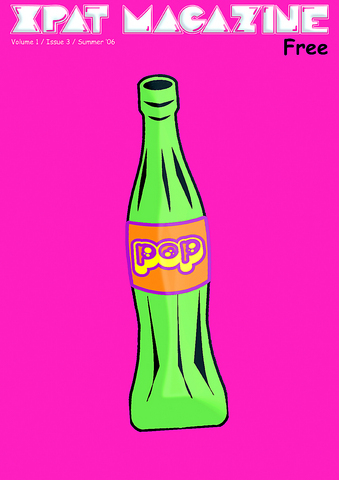
"I figured there were enough artists and dropout writers floating around the island," Gibson said in a phone interview last Thursday. "Most of the people who come to Taiwan (to teach English) have liberal arts degrees."
Among the stories in Xpat's summer issue are a primer on graffiti in Taiwan, a survey of Internet porn and a photo essay on the Yenshui fireworks festival (鹽水蜂炮). Highlights from previous issues include a photojournalist's account of a week spent with street kids in Kathmandu and a photo essay on spirit mediums in southern Taiwan.
Each 50-page issue focuses on a specific theme and is published in full color, with lavish layout spreads that are intended to be works of art in and of themselves. Xpat also publishes fiction and informational stories on topics such as "How You Should Have Prepared for Chinese New Year." Those interested in submitting stories to Xpat can contact Gibson at xpatmag@gmail.com. Back issues and additional content are available on the Web at www.xpatmag.com.
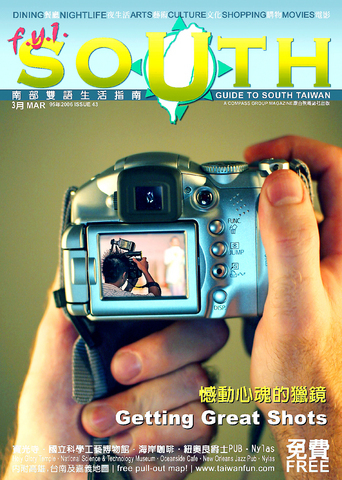
ALL PHOTOS COURTESY OF PUBLISHERS
"We try to get a broad audience of expats, from the just-arrived to the old-timers," said Gibson, who spends about 40 hours a week working on his magazine. "I try to keep it entertaining with some of the lowbrow humor, but we also publish more intellectual stuff."
Xpat launched in December with 4,000 copies distributed at foreigner hangouts in Taichung, Tainan, Chiayi and Kaohsiung. The next issue will be published in the first week of September.
Feedback has been, for the most part, "very good," Gibson said. Criticism has focused on some writers' negative comments about Taiwan. "There has been a tendency for people to vent about Taiwan in the magazine," Gibson said, but he added that he couldn't be picky about content when he doesn't pay his writers.
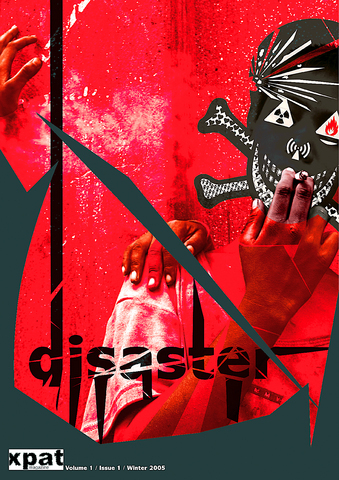
Like Xpat, most magazines run by foreigners are theme-based and do not pay for content. For writers living on the east coast, there's Hualien-based bilingual monthly Highway 11, which founder Ryan St. Onge said is "a travel magazine geared towards tourists but with content interesting enough that people living here would also find it informative." Copies of the 24-page magazine, which publishes 4,000 copies a month, can be found at train stations, restaurants and hotels from Taidung to Taipei. For submissions, send an e-mail to stongerp@yahoo.ca.
"There's very little in Chinese and less than nothing in English in the way of reading material on the east coast," St. Onge said. "There needed to be some sort of voice for it."
24seven started in Taichung and targets a younger, English-speaking demographic with themes like "Get With the Program" and "Propaganda." It now publishes 5,000 copies a month and is based in Taipei, where it has partnered with entertainment portal www.taiwannights.com. For submissions, send an e-mail to submit@24seventaiwan.com.
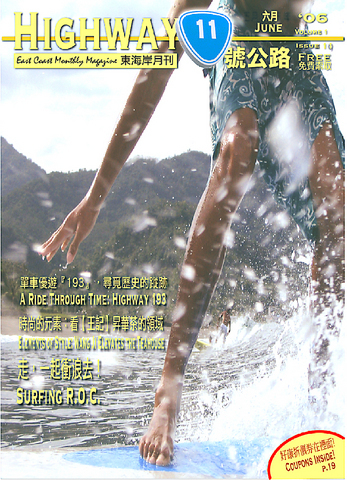
"We're set on making it a viable business opportunity," publisher Reese Richards said.
Taichung Voice, which celebrated its second anniversary last week, is topics-oriented and publishes 2,000 bilingual issues each month. Next month's theme will be animals. For submissions, send an e-mail to editor@thetaichungvoice.com.
"What we're ultimately trying to do is help the expats learn about the Taiwanese and Taiwanese culture, and shed some light on the expat culture to the Taiwanese," said publisher Lance Carroll.
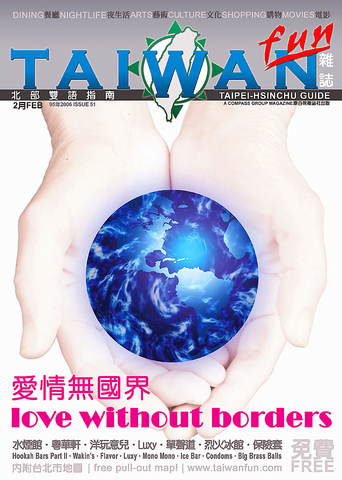
Taiwan's English-language literary journal, Pressed, which also operates out of Taichung, is still accepting stories for its September issue. Pressed publishes 3,500 copies twice a year and relies on donations, not advertisements. For submissions, e-mail pressed@asia.com.
"The freedom that people have here is overwhelming, but the people who actually take advantage of it are few and far between," said publisher Joel McCaffrey. "We're trying to network those people."
Will these magazines become lasting insti-tutions? Publishers said they either plan on sticking it out or making their magazines viable after they've left, but similar operations have come and gone. Taipei-based That (
"This business has a very high turnover rate," said Courtney Donovan Smith, co-publisher of the Compass Group of Media Properties. "It's a very capital-intensive business with low margins, and it takes quite a while to build a good solid readership base."
Compass started in 1994 as a newsletter for Taichung's American Chamber of Commerce. The company separated in 1998 and now publishes monthly bilingual entertainment guides for the Taichung area (Compass), the south (FYI South) and Taipei (Taiwan Fun). Each issue has a print run of 30,000 to 50,000 copies and most readers are Taiwanese. The Web site, www.taiwanfun.com, generated around 1.5 million to 2 million page views last month.
Smith said that an expat magazine can survive indefinitely as long as it maintains a small print run, does not pay for content and if its publishers are willing to occasionally lose money. "When you keep your scale small, it's not such a big deal. But once you get to a certain stage then you need to worry about all the taxes and legal issues." Publishing in Chinese attracts the attention of the authorities, and Compass publishers think twice about publishing stories that mention alcohol, tobacco products or make anything that can be construed as a health claim.
It wasn't until 2000 that Compass grew large enough to enable the company to hire staff. They now employ a dozen, in addition to 30 to 50 freelance translators, writers and photographers.
How did they survive? "Probably because we're stupid. Basically we just stuck with it," Smith said.

Towering high above Taiwan’s capital city at 508 meters, Taipei 101 dominates the skyline. The earthquake-proof skyscraper of steel and glass has captured the imagination of professional rock climber Alex Honnold for more than a decade. Tomorrow morning, he will climb it in his signature free solo style — without ropes or protective equipment. And Netflix will broadcast it — live. The event’s announcement has drawn both excitement and trepidation, as well as some concerns over the ethical implications of attempting such a high-risk endeavor on live broadcast. Many have questioned Honnold’s desire to continues his free-solo climbs now that he’s a

As Taiwan’s second most populous city, Taichung looms large in the electoral map. Taiwanese political commentators describe it — along with neighboring Changhua County — as Taiwan’s “swing states” (搖擺州), which is a curious direct borrowing from American election terminology. In the early post-Martial Law era, Taichung was referred to as a “desert of democracy” because while the Democratic Progressive Party (DPP) was winning elections in the north and south, Taichung remained staunchly loyal to the Chinese Nationalist Party (KMT). That changed over time, but in both Changhua and Taichung, the DPP still suffers from a “one-term curse,” with the

Jan. 26 to Feb. 1 Nearly 90 years after it was last recorded, the Basay language was taught in a classroom for the first time in September last year. Over the following three months, students learned its sounds along with the customs and folktales of the Ketagalan people, who once spoke it across northern Taiwan. Although each Ketagalan settlement had its own language, Basay functioned as a common trade language. By the late 19th century, it had largely fallen out of daily use as speakers shifted to Hoklo (commonly known as Taiwanese), surviving only in fragments remembered by the elderly. In

Lines between cop and criminal get murky in Joe Carnahan’s The Rip, a crime thriller set across one foggy Miami night, starring Matt Damon and Ben Affleck. Damon and Affleck, of course, are so closely associated with Boston — most recently they produced the 2024 heist movie The Instigators there — that a detour to South Florida puts them, a little awkwardly, in an entirely different movie landscape. This is Miami Vice territory or Elmore Leonard Land, not Southie or The Town. In The Rip, they play Miami narcotics officers who come upon a cartel stash house that Lt. Dane Dumars (Damon)